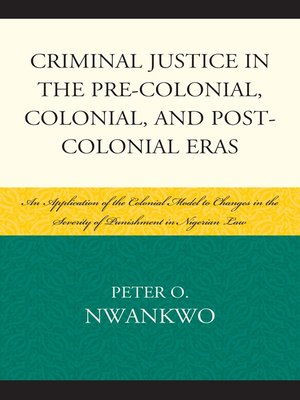Criminal Justice in the Pre-colonial, Colonial and Post-colonial Eras
ebook ∣ An Application of the Colonial Model to Changes in the Severity of Punishment in Nigerian Law
By Peter O. Nwankwo

Sign up to save your library
With an OverDrive account, you can save your favorite libraries for at-a-glance information about availability. Find out more about OverDrive accounts.
Find this title in Libby, the library reading app by OverDrive.



Search for a digital library with this title
Title found at these libraries:
| Library Name | Distance |
|---|---|
| Loading... |
In this text, Nwankwo advances Frantz Fanon's two-revolutionary theory of decolonization, as a basis for predicting the evolution of specific changes in Nigerian law during the pre-colonial, colonial, and post-colonial eras. The author argues that Fanon'smodel of colonial oppression and its categories of maintenance needs are predictive of the evolution from pre-colonial to post-colonial society in Africa. This claim is demonstrated through an analysis of changes in the law during these eras. Changes inthe rank, order of severity of punishment, and the correlative changes in the identification of crime severity comprise the subject matter that this author investigates. Oppression/colonialism must preserve its life through structural/institutional configuration and a particular world view. The former embodies a surplus-deficit arrangement of institutional power and privilege. The latter consists of the ideology that is required to legitimate and ensure conformity with this structural unevenness. Contentanalysis was performed using several variables. The result indicates that colonialism is a subspecies of oppression and that the severity of punishment changes in the Nigerian law during the Colonial era (that is, changes from the personal injury and property crimes of the pre-colonial era to the political crimes of the colonial era) was geared to the maintenance needs of operation.







